形容词、副词(词形转换)讲与练
- 格式:docx
- 大小:37.58 KB
- 文档页数:10
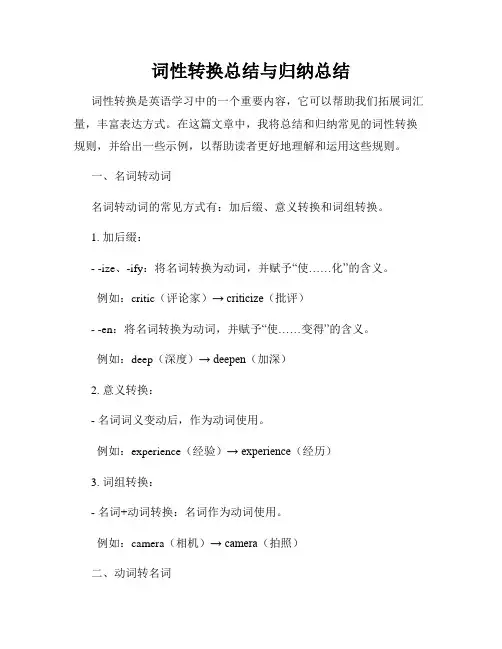
词性转换总结与归纳总结词性转换是英语学习中的一个重要内容,它可以帮助我们拓展词汇量,丰富表达方式。
在这篇文章中,我将总结和归纳常见的词性转换规则,并给出一些示例,以帮助读者更好地理解和运用这些规则。
一、名词转动词名词转动词的常见方式有:加后缀、意义转换和词组转换。
1. 加后缀:- -ize、-ify:将名词转换为动词,并赋予“使……化”的含义。
例如:critic(评论家)→ criticize(批评)- -en:将名词转换为动词,并赋予“使……变得”的含义。
例如:deep(深度)→ deepen(加深)2. 意义转换:- 名词词义变动后,作为动词使用。
例如:experience(经验)→ experience(经历)3. 词组转换:- 名词+动词转换:名词作为动词使用。
例如:camera(相机)→ camera(拍照)二、动词转名词动词转名词的主要方式有:加后缀、意义转换和短语转换。
1. 加后缀:- -tion、-ation、-ment:将动词转换为名词,并赋予“……的行为、状态或结果”的含义。
例如:experience(经历)→ experience(经验)2. 意义转换:- 动词词义变动后,作为名词使用。
例如:swim(游泳)→ swim(游泳运动)3. 短语转换:- 动词+名词转换:动词作为名词使用。
例如:run(奔跑)→ run(竞选)三、形容词转副词形容词转副词的常见方式是:加后缀。
1. 加后缀:- -ly:将形容词转换为副词。
例如:quick(快速的)→ quickly(快速地)四、副词转形容词副词转形容词的方式主要是:移出后缀和意义转换。
1. 移出后缀:- 副词的-ly后缀去掉后,即变为形容词。
例如:beautifully(优美地)→ beautiful(美丽的)2. 意义转换:- 副词的词义变动后,作为形容词使用。
例如:fast(快速地)→ fast(快的)五、形容词转名词形容词转名词的方式主要是:加不定冠词或定冠词。
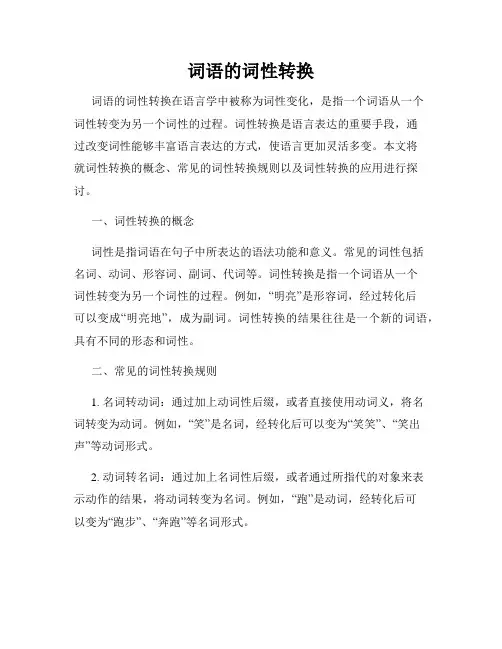
词语的词性转换词语的词性转换在语言学中被称为词性变化,是指一个词语从一个词性转变为另一个词性的过程。
词性转换是语言表达的重要手段,通过改变词性能够丰富语言表达的方式,使语言更加灵活多变。
本文将就词性转换的概念、常见的词性转换规则以及词性转换的应用进行探讨。
一、词性转换的概念词性是指词语在句子中所表达的语法功能和意义。
常见的词性包括名词、动词、形容词、副词、代词等。
词性转换是指一个词语从一个词性转变为另一个词性的过程。
例如,“明亮”是形容词,经过转化后可以变成“明亮地”,成为副词。
词性转换的结果往往是一个新的词语,具有不同的形态和词性。
二、常见的词性转换规则1. 名词转动词:通过加上动词性后缀,或者直接使用动词义,将名词转变为动词。
例如,“笑”是名词,经转化后可以变为“笑笑”、“笑出声”等动词形式。
2. 动词转名词:通过加上名词性后缀,或者通过所指代的对象来表示动作的结果,将动词转变为名词。
例如,“跑”是动词,经转化后可以变为“跑步”、“奔跑”等名词形式。
3. 形容词转副词:通过加上副词性后缀,或者去掉形容词的形容功能,使其表达修饰动作、程度、方式等意义的副词。
例如,“高兴”是形容词,经转化后可以变为“高兴地”、“欢乐地”等副词形式。
4. 副词转形容词:通过加上形容词性后缀,或者通过表示程度的副词来表示一种性质或状态,将副词转变为形容词。
例如,“迅速”是副词,经转化后可以变为“迅速的”、“快速的”等形容词形式。
三、词性转换的应用1. 丰富词语的表达:通过词性转换可以丰富词语的表达方式,使句子更加生动有趣。
例如,“飞”(动词)可以转化为“飞行”(名词),以扩展其表达范围。
2. 增强修饰手段:通过将形容词转化为副词,可以更准确地表达出动作的方式、程度等。
例如,“快”(形容词)可以转化为“快速地”(副词),表示动作的速度或方式。
3. 提高句子的连贯性:通过词性转换,可以使词语在句子中的词性统一,增强句子的连贯性。
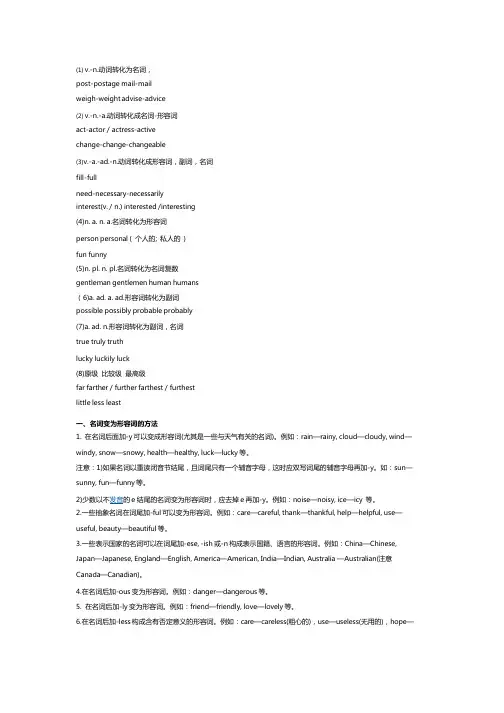
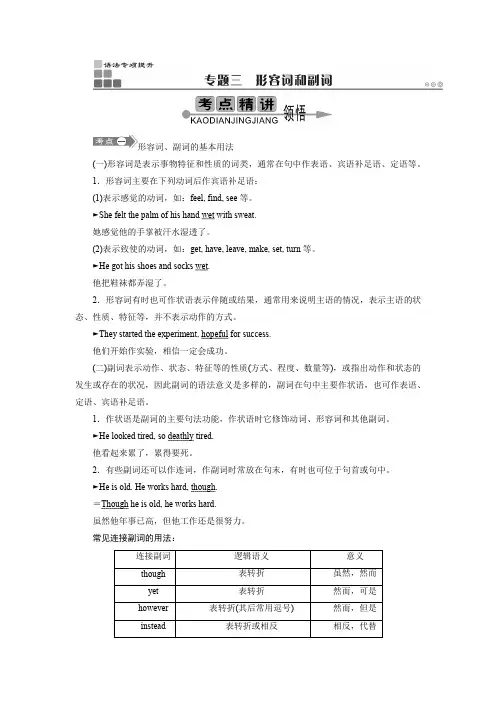
形容词、副词的基本用法(一)形容词是表示事物特征和性质的词类,通常在句中作表语、宾语补足语、定语等。
1.形容词主要在下列动词后作宾语补足语:(1)表示感觉的动词,如:feel, find, see等。
►She felt the palm of his hand wet with sweat.她感觉他的手掌被汗水湿透了。
(2)表示致使的动词,如:get, have, leave, make, set, turn等。
►He got his shoes and socks wet.他把鞋袜都弄湿了。
2.形容词有时也可作状语表示伴随或结果,通常用来说明主语的情况,表示主语的状态、性质、特征等,并不表示动作的方式。
►They started the experiment, hopeful for success.他们开始作实验,相信一定会成功。
(二)副词表示动作、状态、特征等的性质(方式、程度、数量等),或指出动作和状态的发生或存在的状况,因此副词的语法意义是多样的,副词在句中主要作状语,也可作表语、定语、宾语补足语。
1.作状语是副词的主要句法功能,作状语时它修饰动词、形容词和其他副词。
►He looked tired, so deathly tired.他看起来累了,累得要死。
2.有些副词还可以作连词,作副词时常放在句末,有时也可位于句首或句中。
►He is old. He works hard, though.=Though he is old, he works hard.虽然他年事已高,但他工作还是很努力。
常见连接副词的用法:3.等。
►Fortunately, he was not drowned and was saved by the PLA.幸运的是,他没被淹死,被解放军救了。
形容词、副词表示倍数的句型1.A is (v.)+倍数+比较级+than+B2.A is (v.)+倍数+as+原级+as+B3.A is (v.)+倍数+the+名词(size, length, height 等)+of+B4.A is (v.)+倍数+that+of+B5.A is (v.)+倍数+as many/much+名词+as+B6.A is (v.)+倍数+what 引导的名词性从句►This building is two times higher than that one.=This building is three times as high as that one.=This building is three times the height of that one.这个建筑物是那个建筑物的3倍高。

九年级全册重点单词词性转换+专练+100个形容词、副词1. chemistryn.化学一adj.化学的;与化学有关的2. pronouncev.发音→n,发音;读音3. expressv.表达;表示→n.表情;表示;表达方式4. discovery.发现一n.发现;发觉★5. createv.创造;创建—(过去式/过去分词)一adj.有创造力的,创造性的支6. stea1v.偷;窃取一(过去式)一(过去分词)★7. 1ayV.放置;安放;产卵;下蛋T(过去式/过去分词)8. 1ieV.存在;处于;平躺→(过去式)★-(过去分词)9. punishv.处罚;惩罚一n」处罚;刑罚10. centern.中心一adj.中心的;中央的★11. humorn.幽默→adj.有幽默感的;滑稽有趣的12. suggestv.建议;提议一n」建议;提议支13. requirev.要求—所需的(或所要的)东西14. fai1V.不及格;失败;未能做到一n一失败支15. introducev.介绍一→n.介绍★16. Po1iteadj.有礼貌的;客气的一adv.礼貌地;客气地★-adj.不礼貌的;粗鲁的17. si1entadj.沉默的;不说话的T n二沉默;缄默18. absentadj.缺席;不在一n.缺席,缺乏;没有19. exactadj.精确的T adv.确切地;精确地支20. chopstickn.筷子一(p1.)21. g1assn.眼镜一(p1.)22. 1eafn.叶子;叶一(p1.)23. nationn.国家;民族→adj.国家的;民族的一adj.国际的24. customn.风俗;习俗T n.顾客;客户支25. heron.英雄;男主角一(p∣.)26. producev.生产;制造—n.产品;制品27. 1ivev.活;居住;生活→adj.生气勃勃的;(色彩)鲜艳的★28. trans1atev.翻译→n.翻译→n.译员;翻译家29. suddenadj.突然的—adv.突然地30. poemn.诗一n.诗人31. va1uen.价值;重要性T adj.贵重的;很有用的;宝贵的32. wo1fn.才良一(p1.)33. energyn.能量→adj.精力充沛的;充满活力的34. regretv.懊悔;感到遗憾→(过去式/过去分词)★35. educatev.教育—n.教育→adj.教育的;有教育意义的★36. choosev.选择;挑选一n」选择;挑选★→(过去式)→(过去分词)37. e1ectricityn.电力;电流一a可.电子的;电子设备的38. directv.指挥;导演一n_导演;部门负责人39. stickv.粘贴;将……刺入—(过去式/过去分词)40. shutv.关闭;关上一(过去式/过去分词)一(现在分词)41. painn.疼痛-adj.令人痛苦的;令人疼痛的42. tota1n.&adj.总数,合计;总的一adv.完全地;全部地;整个地43. behavev.表现;行为一n」行为;举止十44. bankn.专艮彳亍—n-专艮行家45. wea1thn.财富一adj.富裕的;富有的46. officen.办公室—n.军官;官员★→adj.官方的;正式的47. ringv.(钟、铃等)鸣;响一(过去式)一(过去分词)★48. burnv.着火;燃烧一(过去式/过去分词)49. be1ievev.相信;认为一n.相信;信仰T adj.可相信的;可信任的支50. advantagen.优点;有利条件—(反义词)不利条件;缺点51. harmn.伤害;危害一adj.有害的★→adj.无害的;无恶意的52. 1awn.法律—n-律师53. thirstn.渴;口渴一adj.渴望的;口渴的54. instructv.指导;命令T n.指示;命令答案:1.chemica12.pronunciation3.expression4.discovery5. created;creative6. sto1e;sto1en7.1aid8.1ay;1ain9.punishment10.centra111.humorous12.suggestion13.requirement14.fai1ure15.introduction16.po1ite1y;impo1ite17.si1ence18.absence19.exact1y20.chopsticks21.g1asses22.1eaves23.nationa1;internationa124.customer25.heroes26.production27.1ive1y28. trans1ation;trans1ator29. sudden1y30.poet31.va1uab1e32.wo1ves33.energetic34.regretted35. education;educationa136. choice;chose;chosen37. e1ectronic38.director39.stuck40.shut;shutting41.painfu142.tota11y43.behavior44.banker45.wea1thy46.officer;officia147.rang;rung48.burnt/burned49.be1ief;be1ievab1e50.disadvantage51. harmfu1;harm1ess52.1awyer53. thirsty54.instruction完形填空常考的100个形容词.副词1 >immediateadj立即的,立刻的,马上2、c1earadj清楚的,清晰的3、cautiousadj小心翼翼的4、vividadj生动的,逼真的5、exact1yadv①确切地,精确地②恰好地,正好地③(用于答语)完全正确。
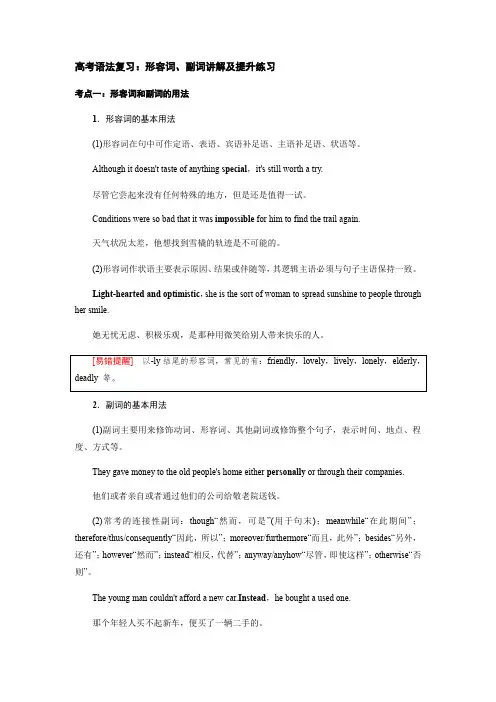
高考语法复习:形容词、副词讲解及提升练习考点一:形容词和副词的用法1.形容词的基本用法(1)形容词在句中可作定语、表语、宾语补足语、主语补足语、状语等。
Although it doesn't taste of anything special,it's still worth a try.尽管它尝起来没有任何特殊的地方,但是还是值得一试。
Conditions were so bad that it was impossible for him to find the trail again.天气状况太差,他想找到雪橇的轨迹是不可能的。
(2)形容词作状语主要表示原因、结果或伴随等,其逻辑主语必须与句子主语保持一致。
Lighthearted and optimistic,she is the sort of woman to spread sunshine to people through her smile.她无忧无虑、积极乐观,是那种用微笑给别人带来快乐的人。
2.副词的基本用法(1)副词主要用来修饰动词、形容词、其他副词或修饰整个句子,表示时间、地点、程度、方式等。
They gave money to the old people's home either personally or through their companies.他们或者亲自或者通过他们的公司给敬老院送钱。
(2)常考的连接性副词:though“然而,可是”(用于句末);meanwhile“在此期间”;therefore/thus/consequently“因此,所以”;moreover/furthermore“而且,此外”;besides“另外,还有”;however“然而”;instead“相反,代替”;anyway/anyhow“尽管,即使这样”;otherwise“否则”。
The young man couldn't afford a new car.Instead,he bought a used one.那个年轻人买不起新车,便买了一辆二手的。
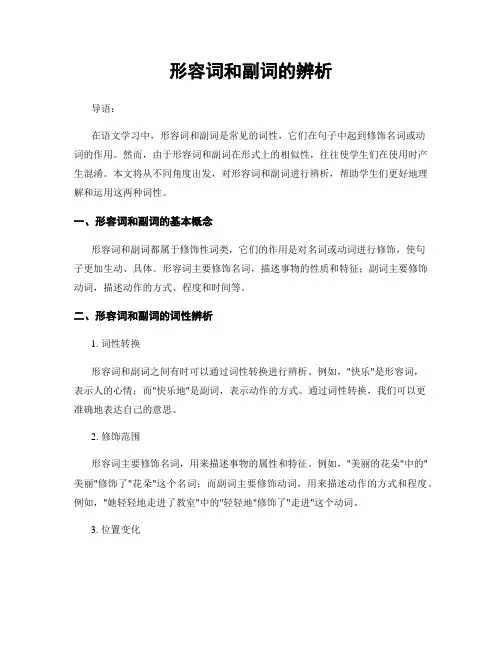
形容词和副词的辨析导语:在语文学习中,形容词和副词是常见的词性,它们在句子中起到修饰名词或动词的作用。
然而,由于形容词和副词在形式上的相似性,往往使学生们在使用时产生混淆。
本文将从不同角度出发,对形容词和副词进行辨析,帮助学生们更好地理解和运用这两种词性。
一、形容词和副词的基本概念形容词和副词都属于修饰性词类,它们的作用是对名词或动词进行修饰,使句子更加生动、具体。
形容词主要修饰名词,描述事物的性质和特征;副词主要修饰动词,描述动作的方式、程度和时间等。
二、形容词和副词的词性辨析1. 词性转换形容词和副词之间有时可以通过词性转换进行辨析。
例如,"快乐"是形容词,表示人的心情;而"快乐地"是副词,表示动作的方式。
通过词性转换,我们可以更准确地表达自己的意思。
2. 修饰范围形容词主要修饰名词,用来描述事物的属性和特征。
例如,"美丽的花朵"中的"美丽"修饰了"花朵"这个名词;而副词主要修饰动词,用来描述动作的方式和程度。
例如,"她轻轻地走进了教室"中的"轻轻地"修饰了"走进"这个动词。
3. 位置变化形容词通常位于名词前面,修饰名词。
例如,"大树"中的"大"修饰了"树"这个名词;而副词通常位于动词后面,修饰动词。
例如,"他慢慢地走过去"中的"慢慢地"修饰了"走"这个动词。
4. 语境判断在一些特定的语境中,我们可以通过判断修饰的对象来辨析形容词和副词。
例如,"他跑得快"中的"快"修饰了"跑"这个动词,表示动作的速度;而"他是一个快人"中的"快"修饰了"人"这个名词,表示人的性格特点。
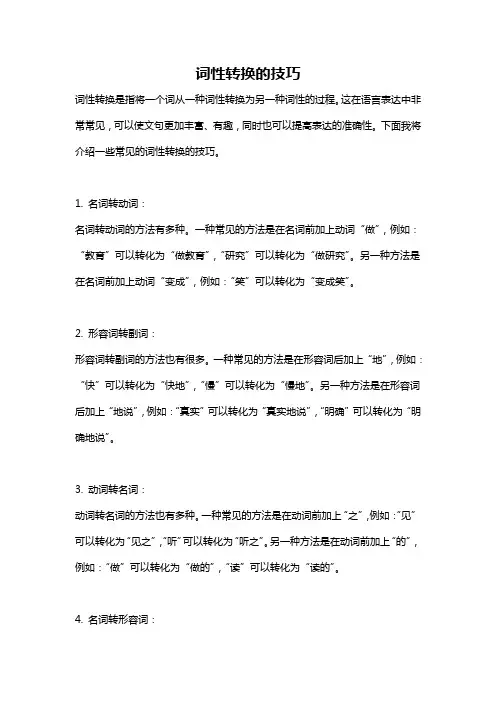
词性转换的技巧词性转换是指将一个词从一种词性转换为另一种词性的过程。
这在语言表达中非常常见,可以使文句更加丰富、有趣,同时也可以提高表达的准确性。
下面我将介绍一些常见的词性转换的技巧。
1. 名词转动词:名词转动词的方法有多种。
一种常见的方法是在名词前加上动词“做”,例如:“教育”可以转化为“做教育”,“研究”可以转化为“做研究”。
另一种方法是在名词前加上动词“变成”,例如:“笑”可以转化为“变成笑”。
2. 形容词转副词:形容词转副词的方法也有很多。
一种常见的方法是在形容词后加上“地”,例如:“快”可以转化为“快地”,“慢”可以转化为“慢地”。
另一种方法是在形容词后加上“地说”,例如:“真实”可以转化为“真实地说”,“明确”可以转化为“明确地说”。
3. 动词转名词:动词转名词的方法也有多种。
一种常见的方法是在动词前加上“之”,例如:“见”可以转化为“见之”,“听”可以转化为“听之”。
另一种方法是在动词前加上“的”,例如:“做”可以转化为“做的”,“读”可以转化为“读的”。
4. 名词转形容词:名词转形容词的方法有多种。
一种常见的方法是在名词后加上“的”,例如:“困难”可以转化为“困难的”,“美丽”可以转化为“美丽的”。
另一种方法是在名词前加上“具有”,例如:“价值”可以转化为“具有价值的”,“特点”可以转化为“具有特点的”。
5. 副词转动词:副词转动词的方法也有多种。
一种常见的方法是在副词后加上动词“做”,例如:“迅速”可以转化为“迅速做”,“安静”可以转化为“安静做”。
另一种方法是在副词后加上动词“变成”,例如:“成形”可以转化为“变成成形”,“明亮”可以转化为“变成明亮”。
6. 状语转形容词:状语转形容词的方法也有多种。
一种常见的方法是在状语前加上形容词“是”,例如:“完全”可以转化为“是完全的”,“不可避免”可以转化为“是不可避免的”。
另一种方法是在状语前加上形容词“之”,例如:“明显”可以转化为“之明显”,“难以置信”可以转化为“之难以置信”。
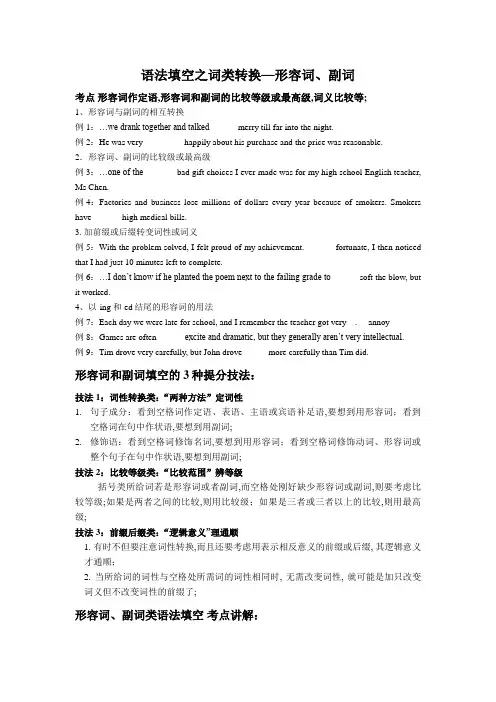
语法填空之词类转换—形容词、副词考点形容词作定语,形容词和副词的比较等级或最高级,词义比较等;1、形容词与副词的相互转换例1:…we drank together and talked merry till far into the night.例2:He was very happily about his purchase and the price was reasonable.2.形容词、副词的比较级或最高级例3:…one of the bad gift choices I ever made was for my high school English teacher, Ms Chen.例4:Factories and business lose millions of dollars every year because of smokers. Smokers have high medical bills.3. 加前缀或后缀转变词性或词义例5:With the problem solved, I felt proud of my achievement. fortunate, I then noticed that I had just 10 minutes left to complete.例6:…I don’t know if he planted the poem next to the failing grade to soft the blow, but it worked.4、以-ing和-ed结尾的形容词的用法例7:Each day we were late for school, and I remember the teacher got very . annoy例8:Games are often excite and dramatic, but they generally aren’t very intellectual.例9:Tim drove very carefully, but John drove more carefully than Tim did.形容词和副词填空的3种提分技法:技法1:词性转换类:“两种方法”定词性1.句子成分:看到空格词作定语、表语、主语或宾语补足语,要想到用形容词;看到空格词在句中作状语,要想到用副词;2.修饰语:看到空格词修饰名词,要想到用形容词;看到空格词修饰动词、形容词或整个句子在句中作状语,要想到用副词;技法2:比较等级类:“比较范围”辨等级括号类所给词若是形容词或者副词,而空格处刚好缺少形容词或副词,则要考虑比较等级;如果是两者之间的比较,则用比较级;如果是三者或三者以上的比较,则用最高级;技法3:前缀后缀类:“逻辑意义”理通顺1. 有时不但要注意词性转换,而且还要考虑用表示相反意义的前缀或后缀, 其逻辑意义才通顺;2. 当所给词的词性与空格处所需词的词性相同时, 无需改变词性, 就可能是加只改变词义但不改变词性的前缀了;形容词、副词类语法填空考点讲解:一.形容词、副词常考点1. 形容词、副词在句中各自作的不同成分;注意fortunately, luckily, honestly,actually, personally等评注性状语往往修饰整个句子,放于句首2.辨别省略了than...的隐性比较级;比较级前常用修饰语much, far, still, even,rather, a little, a bit, a lot3.“否定词+比较级”表示最高级含义4. 在给出的形容词或者副词前加表示否定或相反意义的前缀;二.词性转换加后缀,改变词性1.形容词变副词的后缀1 adj.+ -ly fortunate—fortunately幸运地 general—generally 一般来讲loud—loudly particular 特殊的,独特的—particularlypolite—politely proper 合适的,恰当的---properly2 以-ble或-le结尾的形容词,去掉e加-ycomfortable---comfortably gentle—gently possible---possiblysimple ----simply 仅仅;只;简单地 terrible---terribly3 辅音字母+ y 变 y为i 再加lyeasy—easily heavy—heavily happy--happily angry—angrily,lucky—luckily, noisy—noisily2.动词名词变形容词的后缀名词+able adjustable 可调整 knowledge---knowledgeable comfort---comfortable suit 一套-----suitable 合适的 value—valuable有价值的--al music---musical nature---natural 自然的 person---personal私人的nation—national 国家的 education---educational有教育意义的tradition----traditional 传统的 origin起源---original 新颖的;独创的名词+ ful/less 一些抽象名词在词尾加-ful可以变为形容词在名词后加-less构成含有否定意义的形容词meaning—meaningful 有意义的 care—careful/ careless 小心的;粗心help---helpful / helpless home—homeless 无家可归的use---useless/ useful thank—thankful 充满感激的名词+d talent-----talented 有天赋的organized 有组织的offended 生气的crowded 拥挤的 polluted 被污染的 pleased 高兴的名词+ ous danger—dangerous mystery 神秘-----mysterious 神秘的humor—humorous caution—cautious poison--poisonous名词+y 尤其是一些与天气有关的名词anger 生气-----angry hunger---hungry guilt 罪恶---guilty 内疚的health---healthy luck---lucky cloud---cloudywind—windy rain---rainy snow---snowy sleep---sleepy 昏昏欲睡的salt 盐--- salty 咸的 silk 丝绸—silky 丝绸般的注意:1如果以重读闭音节结尾,且词尾只有一个辅音字母,应双写辅音字母再加"-y".sun—sunny, fun—funny, fog—foggy有雾的 fur—furry毛皮的2少数以不发音的e结尾的名词变为形容词时,应去掉e再加"-y".noise—noisy, ice—icy, shine—shiny发亮的, taste口味—tasty甜的名词+ish有点…的特征 fool--foolish self--selfish child--childish--ive imagine—imaginative effect—effective defend—defensiveaddict—addictive create—creative attract--attractive--some troublesome tiresome wearisome方位的词表达名词+ernEast—eastern West—western South—southern North---northern三.表否定的前缀、后缀只改变词义,不改变词性il-,im-,in-,ir- 否定 impossible不可能的impolite impatientinvisible 不可见 incorrect 不正确的 inactive不积极的irrational不合理的 irregular不稳定的illiterate不识字的 illogical不合理的un- 否定 unstable不稳定的 unknown未知的 unusual不同寻常的unfortunately unnecessary unimportant unfamiliarnon- 否定 nonsmoker不抽烟的人 nonexistent不存在的mis- 错,坏 mistake错误 misspell拼错 misjudge误判 mislead 误导dis- 否定,相反 dislike不喜欢 disappear消失 dishonest不诚实disadvantage 不利条件 disagree 不同意ab- 脱离 abnormal不正常的-less careless hopeless countless endless helpless homeless四.比较等级+比较级…,the+比较级…“越….就越…..”. It is believed that the harder you work, the better result you will get.2. the +比较级+of the two+名词“表示两个中较….的”. Who is the younger of the two boys3.“否定词+比较级”表示最高级. Your story is wonderful; I’ve never heard a better one before.Nothing is easier than this.这是世界上最容易的事情I have never seen such a better picture.我从没看过比这更好的图片4. “the+形容词或副词的最高级+比较范围”表示在某个范围内“最….”. She is the most active student in our class.5. 可以用来修饰比较级的词和短语有 much, far, still, even, rather, a little, a bita lot, a great deal及数字、倍数等,常放在比较级的前面;巩固练习:1.The old man came to our restaurant so_____ frequent that all of us were familiar with him.2.Who is the author of that novel I’ve never read a ________much stirring story.3.For some reason he sat beside Mary. Mary felt_____________ please, because there aremany empty seats in the room.4.Work gets done_________easy when people do it together, and the rewards are higher too.5.Once a habit is formed, it is difficult, and sometimes_____________possible, to get rid of.6.We used to write each other________regular, but I haven’t heard from him since last year.7.As everybody knows, the ________lazya person is, the more things he needs to dotomorrow.8.Young people go to college with the expectation that________good educated people gethigher pay.9.The water was simply the container for an act of kindness and love. Nothing could be________sweet.10.If he thought he could escape attention by sitting at the back, he was wrong. It might havemade it a little______ hard for everybody because it meant they had to turn around, but that didn’t stop the kids in the class.11.He was very tired after doing this for a whole day, but he felt very happy since the crop did "grow" ________high.12.They gave money to the old people’s home either________personal or through theircompanies.13.Andy is content with the toy. It is__________ good than he has ever get.14.With online shopping increasingly popular, the Internet is seen as an ___________efficiency way of reaching target customers.15.This is by far_____________inspire movie that I have ever seen.16.Hardly had Sabrina finished her words when Albert said _______sharp, “Don’t be somean,”pointing a finger of warning at her.17.If we leave right away, ___________ hope we will arrive on time.。
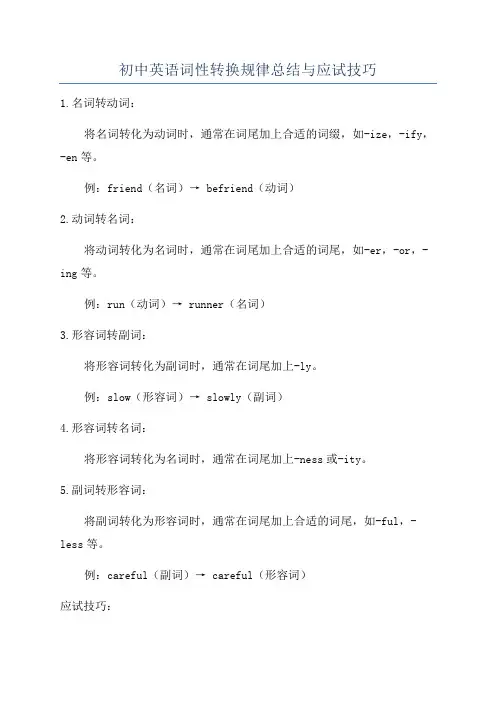
初中英语词性转换规律总结与应试技巧
1.名词转动词:
将名词转化为动词时,通常在词尾加上合适的词缀,如-ize,-ify,-en等。
例:friend(名词)→ befriend(动词)
2.动词转名词:
将动词转化为名词时,通常在词尾加上合适的词尾,如-er,-or,-ing等。
例:run(动词)→ runner(名词)
3.形容词转副词:
将形容词转化为副词时,通常在词尾加上-ly。
例:slow(形容词)→ slowly(副词)
4.形容词转名词:
将形容词转化为名词时,通常在词尾加上-ness或-ity。
5.副词转形容词:
将副词转化为形容词时,通常在词尾加上合适的词尾,如-ful,-less等。
例:careful(副词)→ careful(形容词)
应试技巧:
1.注意词根词缀的变化,有时候词性转换还会伴随着词根的变化。
2.大多数常见的词性转换规律都已掌握,但仍需多练习和记忆,积累的是经验。
3.定期回顾已学习过的词性转换规律,形成记忆,提高应对考试的能力。
4.在考试前,可以查阅常见的词性转换规律,熟悉一些常考的单词词性转换,增加应对考试的信心。
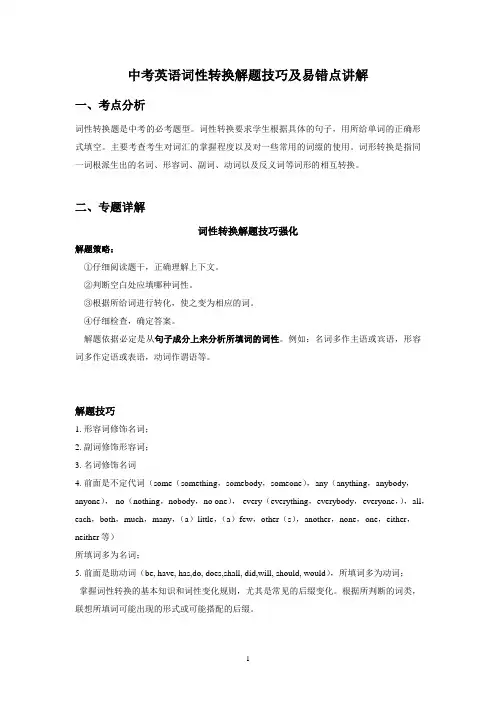
中考英语词性转换解题技巧及易错点讲解一、考点分析词性转换题是中考的必考题型。
词性转换要求学生根据具体的句子,用所给单词的正确形式填空。
主要考查考生对词汇的掌握程度以及对一些常用的词缀的使用。
词形转换是指同一词根派生出的名词、形容词、副词、动词以及反义词等词形的相互转换。
二、专题详解词性转换解题技巧强化解题策略:①仔细阅读题干,正确理解上下文。
②判断空白处应填哪种词性。
③根据所给词进行转化,使之变为相应的词。
④仔细检查,确定答案。
解题依据必定是从句子成分上来分析所填词的词性。
例如:名词多作主语或宾语,形容词多作定语或表语,动词作谓语等。
解题技巧1. 形容词修饰名词;2. 副词修饰形容词;3. 名词修饰名词4. 前面是不定代词(some(something,somebody,someone),any(anything,anybody,anyone), no(nothing,nobody,no one), every(everything,everybody,everyone,),all,each,both,much,many,(a)little,(a)few,other(s),another,none,one,either,neither等)所填词多为名词;5. 前面是助动词(be, have, has,do, does,shall, did,will, should, would),所填词多为动词;掌握词性转换的基本知识和词性变化规则,尤其是常见的后缀变化。
根据所判断的词类,联想所填词可能出现的形式或可能搭配的后缀。
词性转换分类汇总I.形容词——副词1、加lyquiet安静的 quick 快速的 slow慢的 beautiful美丽的 bright明亮的 careful仔细的 certain一定clear清楚 loud大声 sad难过的 wide广泛 serious严重的 usual通常 final最后 safe安全real真的 recent最近的 main主要的 accurate精确的2、去y加ilyeasy容易的 heavy大量angry生气的 hungry饥饿的happy 快乐的 lucky幸运的3、le结尾的,去e变ypossible可能 gentle轻柔的4、不变hard难的;努力地,猛烈地 fast 快early早 late 晚enough足够 straight笔直II. 动词——名词1、加er、or、ress加erfarm 耕种—农民 drive 驾驶—驾驶员司机teach 教—老师 work 工作—工人 write 写—作家 report 报道—记者 win 赢(winner)—获胜者 own 拥有—owner拥有者 paint画、粉刷---画家 manage 经营—经理 record 记录—录音机加oract--actor 男演员 visit—visitor观光者 invent--inventor 发明家 calculate—calculator计算器加resswait—waitress女服务员 act—actress女演员2、加ion结尾add—add i tion 增加 collect—collection 收集 discuss—discussion讨论 decide—decision决定 invent—invention发明物 invite—invitation 邀请 operate—operation手术 pollute—pollution 污染review—revision 复习 solve—solution解答 organize—organization组织 locate—location地点suggest—suggestion建议 protect---prote ction 保护3、加ingbegin—begi nn ing开始 build—building大楼 say—saying 谚语 paint—painting 绘画meet—meeting 会议4、其他serve—service 服务 speak—speech 演讲、言语 fish—fisherman 渔夫 enter—entrance 入口know—knowledge 知识 weigh—weight 重量 please—pleasure 愉快 develop—development 发展choose—choice选择 tour—tourist 游客die—death 死亡 succeed—success 成功fly—flight 飞行、航班 memorize—memory 记忆mix—mixture 混合物 cook—cook 厨师save—safety 安全 act—activity 活动 able—ability 能力III. 名词——名词art艺术—artist画家 science—scientist 科学家city—citizen市民 custom—customer 顾客office—officer 官员 engine—engineer工程师 friend—friendship 友谊business—businessman男商人 business—businesswoman女商人library—librarian 图书管理员 law法律—lawyer律师IV. 名词——形容词1、名词后加fulcare—careful 小心的 use—useful 有用的 help—helpful有帮助的 thank—thankful 感激的wonder—wonderful精彩的 power—powerful 强大的 harm—harmful 有害的2、名词后加ycloud—cloudy 多云的 rain—rainy 下雨的 wind—windy 有风的 snow—snowy 下雪的sun—su nn y 晴朗的 noise—noisy 吵闹的 health—healthy 健康的 fun—funny 滑稽的luck—lucky 幸运的3、名词后加lyfriend—friendly 友好的 love—lovely 可爱的 live—lively 活泼的4、形容词以al 结尾nation—national 国家的 education--educational 教育的 nature—natural 自然的tradition—traditional 传统的 medicine—medical 医药的 physics—physical 物理的chemistry—chemical 化学的 history—historical 历史的5、名词末尾的ce变成tdifference(s)—different 不同 importance—important 重要的6、名词后加enwood—wooden木制的 gold—golden金色的 (wool—woolen 羊毛的)7、名词以ness结尾kindness仁慈—kind仁慈的 illness病疾病--- ill有病的不健康的8、形容词后加ydifficult—difficulty 困难 honest—honesty诚实9、形容词后加domfree—freedom 自由 wise—wisdom 聪明10、其他danger—dangerous 危险的office—official 官方的、正式的fool傻瓜—foolish 愚蠢的west—western 西方的height高度— high高的 length长度—long 长的favour恩惠—favourite 最喜欢的foreigner外国人—foreign 外国的home家—homeless 无家可归的expense费用—expensive 昂贵的 truth真相—true 真实的wound创伤—wounded 受伤的pleasure—pleasant 另人愉快的/ pleased 满意的response相应反映--- responsible 负责的有责任的electricity电—electric电的—electrical 与电有关的—electronic 电子的V. 动词——形容词interest引起兴趣—interesting 有趣的/ interested 感兴趣的excite—exciting 令人激动的/ excited激动的 freeze—freezing 寒冷的/ frozen 冷冻的frighten—frightening 令人害怕的/ frightened害怕的forget—forgetful健忘的 / unforgettable 难忘的 depend—independent 独立的有主见的like—likely很有可能发生的有希望的 realize意识到—real 真的break—broken 碎的 follow—following 下面的 fill—full 满的、饱的enjoy—enjoyable使人愉快的 change—changeable 多变的 act—active 积极的attract—attractive 吸引人的 die—dead 死的 widen拓宽—wide 宽的 live—alive活的VI. 前缀possible—impossible (polite, patient)可能—不可能 tell—retell说—复述build—rebuild 建造—重建healthy—unhealthy健康的—不健康的honest—dishonest诚实—不诚实的appear—disappear出现—消失like—dislike 喜欢—不喜欢male—female 男性—女性VII. 国名——国籍Australia—Australian America—American Canada—Canadian Britain—British England—English Italy—ItalianFrance— French Germany—German (德国人复数German s)强化练习从句子成分角度完成下列习题:1. Thanksgiving is a ______ festival in the USA and Canada. (tradition)2. There were only a few _____ from the air-crash. (survive)3. After careful ____, the committee decided to recommend Mr. Smith for the post. (consider)4. Do you agree that it is important to make yourself _____? (understand)5. I’ve lived in Chongqing for several years and I’m now used to _______hot food. (eat)6. He has to check the _____ of a difficult word before he uses it. (spell)7. The businessman lost a _______ chance to make a big fortune. (gold)9. In some parts of this city, missing a bus means ______ for another hour. (wait)10. Her early ______ gave everyone a big surprise. (arrive)11. The little girl gave an ______ wonderful performance last night. (extreme)12. The more challenging the journey is, the ______ the young people will feel. (happy)13. There has not been a favorable ______ to your plan so far. (respond)14. After they got on the bus, they found two _______. (sit)15. What we have had is just part of the truth. We should try to get ___________ information about it. (far)16. Now more and more gardens are being built in our __________. (neighbour)17. _________ speaking, the computer has become an important part of our life. (general)18. It will ______ rain this afternoon, for the sky is so dark now. (impossible)19. Many people in China are not familiar with ________ customs. (west)20.The room is so dirty that a lot of __________ can be seen running here and there. (mouse)21. It's rude to look ________ at a person. (straight)22. There is no short-cut to _________. ( succeed )23. The reporter went to the sea with several _________ to look for the lost boat. (fish)24. There are many places of ________ interest in Shanghai. (history)25. Mr. Marko is one of the __________ of that factory. (engine)26. It’s ten _________ walk from here. You needn’t take a bus. (minute)27. Jacky told us an ________ story that everybody laughed happily. (amusement)28. Thanks for _______ me. I’ll do my best. (choice)29. It’s much ___________ to swim with your friend than to swim alone. (safe)30. It was snowing _________ outside. (hard)31. How many ___________ lessons do you have every week? (physical)32. They were well ____________ at a friend’s house. (service)33. The sun gives us light and ________. (hot)34. We saw her running _________ the street just now. (cross)35. I’ll do my homework more __________ next time. (care)36. In _________ to hard work, we need some good ways to succeed. (add)37. In the past punishment(惩罚)was decided by the university. The student had no ___________ but to accept it. (choose)38. A ___________ sight stopped them from going forward. (frighten)39. The visitors are ________ students. (main)40. Of all the boys, Li Ming studies ______. (hard)41. These modern machines work ____. (automatic)42. Actions speak _____ than words. (loud)43. I _________ where he comes from. (wonderful)44. We tried all sorts of __________, but they were all useless. (medical)45. Carl looks much ________ than before. (health)46. The little boy can run a marathon in __________ than three hours. (little)47. The lost calculator has been returned to its __________. (own)48. Even __________, he lost his job. (bad)49. Life today is becoming harder and busier, so everyone should have his own way of __________. (relax)50. I am fond of _________ fiction. (scientist)51. Could you tell me whether it is a ________ change or a physical change? ( chemistry )52. The students are not allowed to touch the ________ without permission. ( chemistry )53. Do you know who the telephone was________ by? (invention)54. We went to a beautiful lake and spent an _______________ day. (forget)55. What _____________ weather we are having now! (freeze)56. He tried to make more money to work out a solution to travelling _____________ (expensive)57. She _______ her face with her hands. (discover)58. Our house____________ an area of 200 square metres. (discover)59. The great_______ always teaches me how to _______ the ________ (paint)60. He is one of the most famous _________ in the university. (professional)答案:1-5 traditional;survivors;consideration;understood;eating6-10 spelling;golden;experienced;waiting;arrival;11-15 extremely;happier;response;seats;further16-20 neighborhood;Generally;possibly;western;mice21-25 straight;success;fishermen;historical;engineers;26-30 minutes';amusing;choosing;safer;hard31-35 physics;served;heat;across;carefully36-40 addition;choice;frightening;mainly;hardest41-45 automatically;louder;wonder;medicine;healthier46-50 less;owner;worse;relaxation;science51-55 chemical;invented;unforgettable;freezing55-60 expense;covered;covers;painter- paint-painting ;professor。
高考英语:形容词+副词词性转换知识点总结学考生必备:英语词性转换一、动词变名词1. v+ ment 结尾achieve ——achievement 成就advertise ——advertisement 广告agree ——agreement 同意amuse——amusement 娱乐commit ——commitment 奉献develop ——development 发展disagree ——disagreement 不赞同equip 装备——equipment 装备,器材govern 统治——government 政府manage——management 经营,管理argue ——argument 争吵2.V+ ion 结尾attract ——attraction 吸引discuss ——discussion 讨论express ——-expression 词语;表达instruct ——instruction 指导,介绍invent——invention 发明predict ——prediction 预言impress ——impression 印象suggest ——suggestion 建议,暗示educate ——education 教育graduate ——graduation 毕业operate ——operation 操作,动手术illustrate ——illustration 阐明,举例说明pollute ——pollution 污染introduce ——introduction 介绍organize ——organization组织imagine ——imagination 想象力inspire——inspiration 灵感,鼓舞人心的invite ——invitation 邀请compete ——competition 竞争,比赛pronounce ——pronunciation发音admit ——admission 承认permit ——permission 允许conclude ——conclusion 结论decide ——decision 决定describe ——description描写,描绘resolve ——resolution 决心solve ——solution 解决方法3.V+ ance 结尾allow ——allowance 允许appear ——appearance 外貌,出现perform ——performance 演出exist ——existence 存在4.V+ ing 结尾end ——ending 结尾,结局train ——training训练mean ——meaning 意义say——saying 谚语remind ——reminding提醒bathe ——bathing沐浴5.词尾加-er或-or后变成表示“某一类人”的名词work——worker 工人teach——teacher老师sing——singer 歌手jump——jumper跳高运动员play——player表演者、运动员learn——learner 学习者visit——visitor访问者invent——inventor发明家6.V+ 其他beg——beggar 乞丐sit——seat 座位believe ——belief 信仰behave ——behavior 行为know——knowledge 知识fly——flight 飞行mix ——mixture 混合物press ——pressure 压力serve ——service 服务succeed ——success 成功pursue ——pursuit 追求,从事propose ——proposal 建议withdraw ——withdrawal 取钱;收回;撤退survive ——survival--survivor 幸存者arrive ——arrival到达analyze ——analysis 分析二、形容词变名词1.词尾ent改为ency或enceefficient有效率的——efficiency 效率patient——patience/impatience 耐性/无耐心dependent——dependence依赖性independent——independency 独立性urgent——urgency 紧急2.ble结尾,ble改为bility possible——possibility 可能responsible——responsibility 责任;职责3.其他accurate——accuracy 准确性prosperous——prosperity 繁荣true——truth 真相wide——width 宽度long——length 长度high——height 高度三、名词/动词变形容词1.名词+yhonest ——honesty 诚实的guilt 罪恶——guilty 内疚的health——healthy 健康的luck——lucky 幸运的cloud——cloudy 多云的wind—windy 多风的rain——rainy 多雨的snow——snowy 多雪的tourist ——touristy 游客多的er结尾,改er为ryhunger——hungry 饥饿的anger ——angry 生气的fog——foggy 有雾的sun——sunny 阳关灿烂的fur——furry 毛皮的shine——shiny 发亮的taste ——tasty 美味的2. 名词/动词+ ed以辅音+辅音结尾的单词,直接加edtalent ——talented 有天赋的offend ——offended 生气的crowd ——crowded 拥挤的以元音字母e结尾的单词直接加dbalance ——balanced 平衡的organize——organized 有组织的pollute ——polluted 被污染的please ——pleased 高兴的元音加辅音结尾的单词,词尾辅音双写再加ed spot ——spotted 有斑点的3.名词+ ful/lesscare ——careful/ careless 小心的/ 粗心的help——helpful / helpless 有帮助的/ 无助的use——useful/ useless有用的/ 无用的meaning ——meaningful / meaningless有意义的/无意义的colour——colourful /colourless多彩的/无色的pain 疼痛——painful /painless痛苦的/ 不痛的thank——thankful / thankless 充满感激的/ 不知感恩的peace 和平——peaceful 和平的play游戏——playful 爱玩耍的home ——homeless 无家可归的4.名词/动词+ ablechange ——changeable 易变的adjust——adjustable 可调整的comfort——comfortable 舒适的knowledge——knowledgeable 知识渊博的suit ——suitable 合适的动词以辅音加y结尾把y变i 加able deny——deniable 可否认的rely——reliable 可靠的5.名词+ ouscourage——courageous 勇敢的danger——dangerous 危险的以y结尾,改y为i再加ousmystery 神秘——mysterious 神秘的6.ce 变tconfidence——confident 自信的difference——different 不同的dependence ——dependent 依赖他人的independence——independent 独立的7.词尾加aladdition——additional 附加的,额外的music——musical 音乐的person——personal (私人的) nation——national 国家的education——educational有教育意义的tradition——traditional 传统的origin起源——original 新颖的;独创的以元音字母结尾的单词,去掉词尾元音加al nature——natural 自然的globe——global 全球的特例:class——classical 经典的medicine 药——medical 医学的grammar——grammatical 语法的8.名词+ lyfriend——friendly 友好的live——lively 活跃的,有生气的love——lovely 可爱的week——weekly 每周的man——manly 男子气概的;强壮的9.词尾+ enwood——wooden 木制的wool——woolen 羊毛的10. 表示方位的词East——easternWest——western South——southern North——northern11.四大洲Asia 亚洲——AsianAfrica 非洲——AfricanEurope欧洲——EuropeanAmerica 美洲——American12. 其他energy精力——energetic 精力充沛的strategy——strategic 战略的scientist——scientific 科学的fool 傻子——foolish 愚蠢的love——loving 慈爱的pleasure——pleasant令人愉快的/ pleased高兴的pride——proud 自豪的四、形容词变动词1.词尾加izemodern——modernize 使...现代化social——socialize 使...社会化2.词尾加enfast——fasten 使固定;集中于short——shorten 缩短wide——widen 放宽less——lessen 使...减少特例(有变形):long——lengthen 使延长strong ——strengthen 加强;巩固3.词前加enlarge ——enlarge 扩大;放大五、形容词变副词1.形容词+ lybad——badly 坏地bright——brightly 明亮地casual——casually 随意地clear——clearly 清楚地complete——completely 完全correct——correctly 正确地final——finally 最后fortunate——fortunately幸运地general——generally 一般来讲loud——loudly 大声地particular ——particularly特别地polite——politely 礼貌地proper ——properly适当地main——mainly 主要地most ——mostly 多半,大多数normal——normally 正常地quick——quickly 迅速地quiet——quietly 轻轻地,安静地real——really 真正地recent ——recently 最近;近来sad——sadly 悲哀地slow——slowly 缓慢地special——specially 专门,特殊地specific——specifically 特定地,明确地strong——strongly 坚决地,强烈地sudden——suddenly突然usual——usually 通常2. 以le 结尾的,去e+y comfortable——comfortably 舒服地gentle——gently 温柔地possible——possibly 可能地simple——simply 仅仅;只;简单地terrible——terribly 非常;极度地3. 辅音字母+ y 变y为ily easy——easily 容易地heavy——heavily 沉重地happy——happily 快乐地4.特殊good——well好地true——truly 真实地。
英语形容词和副词的词性转换与用法英语形容词和副词在句子中扮演着重要的角色,它们用来描述名词或动词的特征和方式。
本文将介绍英语形容词和副词的词性转换以及它们的常见用法。
形容词和副词的基本概念形容词(Adjective)是用来修饰名词或代词的词语,表示事物的性质、特征或状态。
例如,“beautiful”(美丽的)和“interesting”(有趣的)就是形容词。
副词(Adverb)用来修饰动词、形容词、副词等,表示一种动作的方式、程度或特点。
例如,“quickly”(快速地)和“very”(非常)就是副词。
形容词和副词的词性转换在英语中,形容词和副词之间常常存在词性转换的关系,形容词可以转换为副词,副词也可以转换为形容词。
形容词转副词形容词转换为副词的一般规则是在词尾加上“-ly”。
例如:- Beautiful(美丽的)→ Beautifully(美丽地)- Quick(快速的)→ Quickly(快速地)- Careful(小心的)→ Carefully(小心地)需要注意的是,并不是所有的形容词都可以直接转换为以“-ly”结尾的副词,有些形容词的副词形式并不规则,需要单独记忆。
副词转形容词副词转换为形容词的一般规则是去掉词尾的“-ly”。
例如:- Slowly(慢慢地)→ Slow(慢的)- Clearly(清楚地)→ Clear(清楚的)- Loudly(大声地)→ Loud(响亮的)同样地,有些副词的形容词形式也不规则,需要单独记忆。
形容词和副词的常见用法形容词和副词在句子中的用法有以下几种情况:1. 修饰名词:形容词可以直接修饰名词,用来描述名词的特征或属性。
例如,“a beautiful flower”(一朵美丽的花)。
2. 修饰代词:形容词可以修饰代词,用来描述代词的特征。
例如,“she is kind”(她很友善)。
3. 修饰动词:副词可以修饰动词,用来描述动作的方式或程度。
例如,“He runs quickly”(他跑得很快)。
1.什么是词性转换举例说明?
答:词性转换是指一般的名词、动词、形容词、副词可以在添加或减去一些前或后缀后得到新的单词。
名词转译成动词,一些由动词词根派生的名词以及含有动作意味的名词常可转译为汉语的动词,英语中介词的使用频率相对于汉语来说要高得多,实际上英语中很多介词在语境中可带有明显的动作意味。
英语词性转换类型
(1)v,-n动词转化为名词,
post-postagemail-mailweigh-weightadvise-advice。
(2)v,-n,-a动词转化成名词-形容词
act-actor/actress-activechange-change-changeable。
(3)v,-a-,ad,-n动词转化成形容词,副词,名词fill-full,
need-necessary-necessarilyinterest(v/n)interested/interesting。
(4)n,an,a名词转化为形容词personpersonal(个人的;私人的)funfunny。
专题二需要“变形”的名词、形容词和副词第五讲形容词和副词1.(2020·全国卷Ⅰ·语法填空)Landing on the moon's far side is________(extreme)challenging.解析:考查副词。
句意:登陆月球的背面是极具挑战性的。
空处修饰形容词challenging,应使用extreme 的副词形式,故填extremely。
答案:extremely2.(2020·全国卷Ⅱ·语法填空)________(certain)during the holiday period,this plant is a must.解析:考查副词。
句意:当然在假期期间,这种植物是绝对必要的事物。
介词短语做时间状语,因此只有改变成副词才能复合句子结构,用副词形式做状语。
故填Certainly。
答案:Certainly3.(2020·全国卷Ⅱ·语法填空)The________(beauty)long branches covered with pink-colored buds(蓓蕾)make fantastic decorations.解析:考查形容词。
句意:美丽的长枝上覆盖着粉红色的花蕾,做成漂亮的装饰。
修饰名词branches,用形容词形式。
故填beautiful。
答案:beautiful4.(2020·全国卷Ⅲ·语法填空)As the small boat moved,________(gentle)along the river he was left speechless by the mountains being silently reflected in the water.解析:考查副词。
句意:当小船缓缓地沿着江面移动时,山在水中的倒影使他说不出话来。
此处修饰动词moved应用副词gently作状语,表示“缓缓地。
词性转换练习题及答案词性转换是语言学习中一个非常重要的部分,能够帮助我们更有效地理解和使用词汇。
在这篇文章中,我为大家准备了一些词性转换练习题及答案,希望能够帮助您巩固所学知识。
一、动词转换为名词1. invent(动词)→ __________(名词)答案:invention2. achieve(动词)→ __________(名词)答案:achievement3. explore(动词)→ __________(名词)答案:exploration4. decide(动词)→ __________(名词)答案:decision5. contribute(动词)→ __________(名词)答案:contribution二、形容词转换为副词1. quick(形容词)→ __________(副词)答案:quickly2. easy(形容词)→ __________(副词)答案:easily3. slow(形容词)→ __________(副词)答案:slowly4. careful(形容词)→ __________(副词)答案:carefully5. cheerful(形容词)→ __________(副词)答案:cheerfully三、名词转换为形容词1. success(名词)→ __________(形容词)答案:successful2. beauty(名词)→ __________(形容词)答案:beautiful3. health(名词)→ __________(形容词)答案:healthy4. power(名词)→ __________(形容词)答案:powerful5. happiness(名词)→ __________(形容词)答案:happy四、副词转换为动词1. simply(副词)→ __________(动词)答案:simplify2. slowly(副词)→ __________(动词)答案:slow3. quickly(副词)→ __________(动词)答案:quicken4. actively(副词)→ __________(动词)答案:activate5. clearly(副词)→ __________(动词)答案:clarify五、动词转换为副词1. dance(动词)→ __________(副词)答案:dancing2. sing(动词)→ __________(副词)答案:singing3. run(动词)→ __________(副词)答案:running4. swim(动词)→ __________(副词)答案:swimming5. play(动词)→ __________(副词)答案:playing通过词性转换的练习,我们能够更加灵活地运用词汇,增加我们的表达能力。
知识点六词性转换I.形容词——副词1、加lyquiet安静的beautiful美丽的bright明亮的careful仔细的certain一定clear清楚loud大声sad难过的wide广泛serious严重的usual通常final最后safe安全real真的recent最近的main主要accurate精确的2、去y加ilyeasy—_____容易的heavy—_____大量angry—_____生气的hungry—_____饥饿的happy—_____ 快乐的lucky—_____幸运的3、le结尾,去e加y possible—_____可能gentle—_____轻柔的4、不变hard难的努力地,猛烈地fast 快early早late 晚enough足够straight笔直II. 动词——名词1、加(e)r、or、ressfarm 耕种—farmer农民drive 驾驶—driver驾驶员teach 教导—teacher老师work 工作—worker工人write 写—_____作家report 报道—reporter记者win 赢—_____获胜者own 拥有—_____拥有者paint画、粉刷—painter画家manage 经营—manager经理record 记录—recorder录音机act--actor 男演员visit—visitor观光者invent--inventor 发明家calculate—_____计算器wait—waitress女服务员act—actress女演员2、加ion结尾add—addition加collect—collection 收集discuss—discussion讨论decide—_____决定invent—invention发明物invite—invitation 邀请operate—operation手术pollute—pollution 污染solve—_____解答organize—_____组织locate—_____地点suggest—_____建议protect-—protection 保护3、加ingbegin—_____开始build—building大楼say—saying 谚语paint—painting 绘画meet—meeting 会议train—_____培训mean—meaning意义4、其他serve—_____服务speak—_____演讲、言语fish—_____渔夫enter—_____入口know—_______知识weigh—_____重量please—_____愉快develop—_____发展choose—_____选择tour—_____游客die—_____死亡succeed—_____成功fly—_____飞行、航班memorize—_____记忆mix—_____混合物cook—_____厨师save—_____安全act—_____活动able—_____能力relax—_____放松practice—______练习III. 名词——名词art艺术—_____画家science—_____科学家city—_____市民custom—_____顾客office—_____官员engine—_____工程师friend—_____友谊business—_____男商人business—_____女商人library—_____图书管理员law—_____律师neighbour—_____邻居IV. 名词——形容词1、名词后加ful care—careful 小心的use—useful 有用的help—helpful有帮助的thank—thankful 感激的wonder—wonderful精彩的power—powerful 强大的harm—harmful 有害的2、名词后加ycloud—cloudy 多云的rain—rainy 下雨的wind—windy 有风的snow—snowy 下雪的sun—______晴朗的noise—_____ 吵闹的health—healthy 健康的fun—______ 滑稽的luck—lucky 幸运的3、名词后加ly friend—friendly 友好的love—_____可爱的4、形容词以al 结尾nation—national 国家的education—educational 教育的nature—______ 自然的tradition—______ 传统的medicine—______ 医药的physics—______ 物理的chemistry—______ 化学的history—______ 历史的5、名词末尾的ce变成t difference(s)—different 不同importance—important 重要的6、名词后加enwood—wooden木制的gold—golden金色的7、形容词后加y difficult—difficulty 困难honest—honesty诚实8、形容词后加domfree—_____自由wise—_____聪明9、其他danger—dangerous危险的office—_____官方的fool—_____愚蠢的west—_____西方的favour—_____最喜欢的foreigner—foreign 外国的home—_____无家可归的expense—expensive 贵的truth—true 真实的wound—_____受伤的response—_____负责的electricity—electric电的—electronic 电子的V. 前缀possible—_____可能、不可能(同样适用polite, patient)healthy—_____健康的—不健康的honest——_____诚实—不诚实的appear——_____出现—消失like—_____喜欢—不喜欢练习1.His ___________ sister is only one year older than he. (old)2. The Smiths live on the __________ floor of the building. (nine)3. All the great __________ are respected by the world. (invent)4. I’ll do my homework more __________ next time. (care)5. When you study a foreign language, it’s important to make a good______. (begin)6. I helped the old man to show my ______. (kind)7. In the past punishment was decided by the university. The studenthad no _________ but to accept it. (choose)8. Our teacher told us the _____ story I had ever heard . (sad)9.What nice __________! Let’s put them on the walls of the meetingroom. (paint)10. The old lady was too _______ to say a word. (frighten)11. A ___________ sight stopped them from going forward. (frighten)12.Mary ________ playing the piano for two hours every day.(practice)13.The wind is blowing _______. It’s the right time to fly kites.(gentle)14. The visitors are ________ students. (main)15.English has more ______ who learn it as a second language thanChinese. (speak)16.Could you tell me who will give us a ________ on children’seducation (speak)17. To my ________, I got full marks for maths last week. (surprised)18. In winter, most of the rivers and lakes are _____. (freeze)19. In _________ weather, the water is always covered with ice.(freeze)20.We’ve to work out a ___ to the problem. (solve)21.The doctors were busy operating on the _______ soldier duringthe war. (wound)22.Your pet dog is so __________ that all of us like to play withit. (love)23. Of all the boys, Li Ming studies ______. (hard)24. We are all pleased to hear that the _________ went on very well.( operate)25.WHO means World Health ________. (organize)26. These modern machines work . (automatic)27. This cartoon film is _________ than the one I saw last Saturday.(fun)28. I think the success will depend on your __________ not your money.( wise)29.As we entered the garden, we saw a little girl ______ on the grassin the sun. (lie)30.The shopping center is always _________ of customers at weekends.(fill)31.Do you know the __________ of the nearest police station(located)32.A few friends of __________ will come to our dinner party tonight.(we)33. We have been told the ______ of the case. (true)34. I felt _________ sorry for having missed such a wonderfulfootball match. (truth)35. The weather is _____, so you’d better take an umbrella withyou. (change)36.To be ___________, I think you didn’t sing as well as Jack.(honesty)37. You cannot eat so much fast food, because it is ___________.(health)38.Everyone should take an ________ part in sports events.( activity)39. We all know that there’s no _________ thing on the moon. (live)40. No one knows whether Bin Laden is still ___________ or not.(live)41. I can’t find my wallet. It has ________! (appear)42.The mother was _________ to the brave man who had saved her son.(thank)43. Many students are not able to pay their college ________.(expensive)44.I don’t think it a good idea. Do you want to listen to my ________(suggest)45.George Stephenson became famous in his _________. (twenty)46.That girl’s _______ hair attracted al l of us. (gold)47. It’s a _________ to have a picnic with all the family members.(please)48. The lost calculator has been returned to its __________. (own)49. Be sure to let me know whenever you are in __________.( dangerous)50. She took the two o’cl ock __________ to Chicago just now. (fly)51. The tall _________ is one of my father’s best friends. (art)52. Have you decided to take the headmaster’s __________ (advise)53. Many people became after the fire. (home)54. They were well ____________ at a friend’s house. (service)55.The street has been _____ by the workers. (wide)56.Chinese will be _________ used in the world from now on. (wide)57.As the ______ goes, “ No pains, no gains”. (say)58.Every month you can get three thousand yuan at _______. (little)59. Although he worked hardest, he got the ___________ money of all.(little)60. My family have been to Beijing __________ to climb the GreatWall. (two)61. One shouldn’t give up easily if he is determined to __________.(success)62. He can do everything on ______ own. (he)63. Do you know if the headmistress of the school is a _________teacher (chemical)64. The teacher told them that had been a ___________ change.(physics)65. The patient is getting ________. The doctors will use newmedicine for him. (ill)66. Even __________, he lost his job. (bad)。
形容词、副词(词形转换)讲与练[ 想一想]I. 在下列句子的空格处填上适当的单词。
1. The little boy was _____ ill that nothing could be done to save him.2. When she heard the news, she was ____ excited to say a word.3. ___ had she got to the staion when the train left.4. No ____ had Tom got home when it began to rain heavily.5. It was _____ a hot day that many people went swimming in the river.6. Though he is not rich himself, he tries his best to help ____ poor.7. He was late time and again for his work. _____ , he got fired last week.8. She failed many times in the experiment. ____ , she wouldn 't give up.9. Lily is one of _____ most hardworking student in our class.10. Tommy can run much faster ___ all of his classmates.11. Li Ming can speak English ____ well as a native speaker does.12. Mary does her experiment _____ carefully than all the other girls do.13. This building is three times ____ height of the building on the other side of the road.14. Though this hotel isn 'tthe best one in this city, it is ___ most comfortable hotel.15. Do you know ____ shorter of the two girls?1. so2. too3. Hardly/Scarcely4. sooner5. such6. the7. Therefore8. However 9. the 10. than 11. as 12. more 13. the 14. a 15. theII .用括号中所给单词的适当形式填空1. Just then, the sick old lay down ______ (die).2. As we all know, English is ____ (wide) used in our daily life.3. The foolish farmer tried to help his crops grow ____(high) by plucking them.4. The Changjiang River is ten times the _____ (long) of that one.5. She was so _____ (excite) that she couldn't say a word.6. It is known to all that the Changjiang River is the first _____ (long) river in China.7. Would you please tell me the ____ (late) news about the incident?8. I don't think your demand is quite ________ (reason).9. She made so many ____ (care) mistakes that she failed the test this time.10. You must work hard so that you can make more ____ (contribute) to the country.11. You ' d better fill in the _____ (apply)form first if you want to apply for this job.12. There is no _____ (argue) as whether to put off the meeting till tomorrow.13. Mr. Li has been interested in _____ (photo) when he was still a little boy.14. Each of us is able to enjoy ____ (free) of speech in our country.15. His theory is of great ____ (significant) to our experiment.Keys: 1. dead 2. widely 3. higher 4. length 5. excited 6. longest 7. latest8. reasonable 9. careless 10. contributions 11. application 12. argument13. photography 14. freedom 15. significance [讲一讲]对于形容词和副词,我们应侧重于下面几个方面的知识的复习与掌握:1. 形容词常用作表语或定语;而副词则用作状语,修饰句中的动词,也可用于修饰形容词或其它的副词。
如:The old man is always ready to help others.2. 形容词还可用在句中作状语,表示伴随、原因或结果等。
女口:He we nt to bed, cold and hungry. / The dog lay down, dead.3. 大多数以a-开头的形容词一般用在句中作表语,也可作后置定语。
这类形容词有:alone、afraid、awake、alive、alike、asleep等。
如:She is the only person alive in the accident..注意掌握形容词和副词的基本用法:4.某些形容词前面加上定冠词可以表示一类人或物。
这类形容词有:rich、poor、old、young、beautiful 、dead 等。
如:We should pay more attention to the old in cold days.二.注意把握固定句型中的形容词或副词。
在语法填空题中,我们常常发现会考查这些句型中的形容词或副词,因为它们的搭配都是固定的,不可更改。
如:too…to结构、so…that结构、hardly…when、no sooner…than、such…that、so/as…as。
这些句型中的副词通常都是被考查的对象。
三.英语中,有相当一部分副词表示一定的逻辑关系。
这些词语往往也是被考查的对象。
这类副词常见的有:A .表示转折关系的畐U词:however、nevertheless、otherwise 等。
B .表示因果关系的副词:therefore、thus等。
C. 表示递进关系的畐U词:b esides furthermore、moreover 等。
D .表示次序的副词:firstly > fin ally、seco ndly、thirdly 等。
四.注意把握形容词和副词的三级及相关用法:1. as/so ... a s 结构中,只能用形容词或副词的原级。
此外还要注意它所修饰的对象是名词还是动词,从而确定as/so....as结构中用形容词还是副词。
as....as可用于肯定句和否定句中,而so....as结构只能用于否定结构。
如:1) .She is not so/as careful as her brother.2) .She doesn't write so carefully as her brother.2. 表示两者或两部分进行比较时要用比较级。
三者进行比较时,则要用最高级。
单音节和双音节的比较级和最高级分别在词尾加-er或-est构成比较级或最高级。
多音节形容词或副词的比较级和最高级则是在单词的前面加more或most构成最高级。
如:1) .Tom writes more carefully than Mike, but Green writes the most carefully in the three.2) .Tom is taller than Mike, but Mike is the tallest of the three.3 .在比较级前,常用much、little、a little、still、even、far、a lot 等修饰。
但more 修饰一个名词时,意为“又,再,还” 。
这时,more 前面的修饰语一定要能够修饰后面的名词. 如:1).She runs even faster than her mother.2) .Please give me two more apples.3) .Would you like some more coffee?4. 最高级前通常用定冠词修饰,但副词的最高级可不用the 修饰。
如:1) .Mike is the tallest boy in this class.(Mike 是这个班最高的男孩。
)2) .She runs fastest of the three.(在三个人当中,她跑得最快。
)5. 在形容词的比较级和最高级前面还可用冠词修饰:1) . the+比较级”往往表示"两者中较.…的那个”。
如:the taller of the two girls(两个女孩子中较高的那个);2) . a/an+比较级+名词”则表示"一个更/较...的”。
女口:Give me a bigger即ple.(给我一个更大一些的苹果.)3) ..................................................................... . the + 形容的最高级+ 名词”表示"最的”。